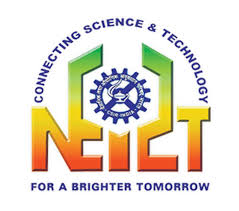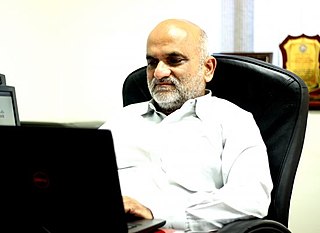Chhitar Mal Gupta is an Indian molecular biologist and academic, known for researches on transbilayer phospholipid asymmetry in biological membranes., drug targeting in parasitic diseases and characterization of structure and function of Leishmania actin and actin binding proteins. He is former director of the Central Drug Research Institute, Lucknow and the Institute of Microbial Technology, Chandigarh. A Distinguished Biotechnology Fellow and Distinguished Biotechnology Research Professor of the Department of Biotechnology, Government of India, he is an elected fellow of The World Academy of Sciences, Indian Academy of Sciences, Indian National Science Academy, National Academy of Sciences, India and the National Academy of Medical Sciences. The Council of Scientific and Industrial Research, the apex agency of the Government of India for scientific research, awarded him the Shanti Swarup Bhatnagar Prize for Science and Technology, one of the highest Indian science awards, in 1985, for his contributions to biological sciences.

North East Institute of Science and Technology (NEIST), Jorhat is a constituent establishment of the Council of Scientific and Industrial Research (CSIR), a premier R&D organization of India, which has a chain of laboratories across the country. This laboratory was established in 1961 under the chemical science group of CSIR and originally its main aim was to develop indigenous technologies by utilizing the immense natural resources of northeastern India like Petroleum, Coal, Natural Gas, Minerals, Tea, Microbes, Aromatic and Medicinal plants. Theme of the institute for the year 2020 is "Revitalizing NEIST for Strengthening North East."

Gajendra Pal Singh Raghava is an Indian bio-informatician and head of computational biology at the Indraprastha Institute of Information Technology.
Samir Kumar Brahmachari is an Indian biophysicist and Former Director General of the Council of Scientific & Industrial Research (CSIR) and Former Secretary, Department of Scientific and Industrial Research (DSIR), Government of India. He is the Founder Director of Institute of Genomics and Integrative Biology (IGIB), New Delhi and the Chief Mentor of Open Source for Drug Discovery (OSDD) Project. He is the recipient of J.C Bose Fellowship Award, DST (2012). In addition, he is one of the featured researchers in the India Cancer Research Database developed by Institute of Bioinformatics (IOB), Bangalore with support from the Department of Biotechnology, Government of India.
Computational Resources for Drug Discovery (CRDD) is one of the important silico modules of Open Source for Drug Discovery (OSDD). The CRDD web portal provides computer resources related to drug discovery on a single platform. It provides computational resources for researchers in computer-aided drug design, a discussion forum, and resources to maintain a Wikipedia related to drug discovery, predict inhibitors, and predict the ADME-Tox property of molecules. One of the major objectives of CRDD is to promote open source software in the field of chemoinformatics and pharmacoinformatics.

Garikapati Narahari Sastry is an Indian chemist. He has taken charge as Director of CSIR-North East Institute of Science and Technology, Jorhat, Assam on 19 February 2019. After taking charge as the Director, he has worked towards converting knowledge in the areas of computational modelling and Artificial intelligence from basic to translational research, by working closely with society and industry. Ultimately, revitalizing the strength of science and technology is essential in achieving the self-reliant and strong India. In the era of Industry 4.0 and 5.0, combining our traditional wisdom with modern science appear to be indispensable in the sectors such as Education, Health, Agriculture, Industrial and Societal development at large. Prior to joining as the Director, he headed the Molecular Modelling Division at the CSIR Indian Institute of Chemical Technology in Hyderabad, India. Sastry has made pioneering contributions in the areas of computational chemistry and computational biology.
Sandip Kumar Basu is an Indian molecular biologist and the holder of the J. C. Bose Chair of the National Academy of Sciences, India, who is credited with innovations in the treatment protocols of leishmaniasis, tuberculosis, viral infections, multidrug resistant cancer and arterosclerosis. He was honored by the Government of India, in 2001, with the fourth highest Indian civilian award of Padma Shri.
Gyan Chandra Mishra is an Indian immunologist, cell biologist and the Director of the National Centre for Cell Science, Pune, known for his researches towards the therapeutic control of diseases such as HIV, tuberculosis and malaria. He was honoured by the Government of India in 2003 with Padma Shri, the fourth highest Indian civilian award.
Open Source Drug Discovery is a Council of Scientific and Industrial Research, India (CSIR)-led Team India Consortium with global participation offering a collaborative drug discovery platform for neglected tropical diseases like leishmaniasis, which draw limited attention of research-based pharmaceutical enterprises. This program has a global community with over 7500 participants from 130 countries comprising researchers, academia, students, industries, educational institutions and so on. Anyone who is committed to the discovery of drugs for neglected diseases in an open source mode can participate in the program. OSDD functions by bringing together experts from diverse backgrounds to focus on discovering and developing affordable drugs for tropical infections.
Alok Bhattacharya is an Indian parasitologist, academic and a professor at the School of Life Sciences of the Jawaharlal Nehru University. He chairs the Biotechnology Information System Network (BITSNET) as well as the Life Sciences Expert Committee of FIST program of the Department of Science and Technology (DST). He is an elected fellow of the Indian Academy of Sciences and the Indian National Science Academy and is known for his studies on Entamoeba histolytica and species-specific calcium binding protein and its gene.
Narayanaswamy Srinivasan was an Indian molecular biophysicist and a professor and the head of Proteins: Structure, Function and Evolutionary Group at the Molecular Biophysics Unit of the Indian Institute of Science. He is known for his researches in the fields of computational genomics and protein structure analysis. An elected fellow of the Indian Academy of Sciences and the National Academy of Sciences, India, he is a J. C. Bose National fellow of the Department of Biotechnology and a recipient of the National Bioscience Award for Career Development of the Department of Science and Technology. The Council of Scientific and Industrial Research, the apex agency of the Government of India for scientific research, awarded him the Shanti Swarup Bhatnagar Prize for Science and Technology, one of the highest Indian science awards, in 2007, for his contributions to biological sciences.

Sorin Drăghici is a Romanian-American computer scientist and a program director in the Division of Information and Intelligent Systems (IIS) of the Directorate for Computer and Information Science and Engineering (CISE) at the National Science Foundation (NSF). Previous positions include: Associate Dean for Entrepreneurship and Innovation of Wayne State University's College of Engineering, the Director of the Bioinformatics and Biostatistics Core at Karmanos Cancer Institute, and the Director of the James and Patricia Anderson Engineering Ventures Institute. Draghici was elected a Fellow of the Institute of Electrical and Electronics Engineers (IEEE) in 2022, for contributions to the analysis of high-throughput genomics and proteomics data

Anil Koul is a scientist and former Director of the CSIR-Institute of Microbial Technology (IMTECH), a premier biomedical and biotechnology research institution under Council of Scientific and Industrial Research (CSIR) under Ministry of Science and Technology, Govt. of India.

Yogesh S. Shouche is an Indian microbiologist. Currently, he is Principal Investigator of National Centre for Microbial Resource at the National Centre for Cell Science, Pune, India.
Srinivasan Ramachandran is an Indian biologist, bioinformatician and a senior principal scientist at the department of genome analysis of the Institute of Genomics and Integrative Biology. Known for his studies in the field of data analytics, Ramachandran is also an adjunct faculty, senior Principal Scientist and AcSIR Professor at the Faculty of Biological Sciences of the Indian Institute of Technology, Delhi. The Department of Biotechnology of the Government of India awarded him the National Bioscience Award for Career Development, one of the highest Indian science awards, for his contributions to biosciences in 2007.
Dibyendu Sarkar is an Indian biochemist, molecular microbiologist and a Chief Scientist at the Institute of Microbial Technology. He is known for his studies on Mycobacterium tuberculosis (Mtb), the bacterial pathogen causing the disease of tuberculosis. His studies have been documented by way of a number of articles and Google Scholar, an online repository of scientific articles has listed 23 of them. He has also delivered invited speeches which included the Second Annual Meeting on Infectious Diseases held at the Indian Institute of Science in September 2017. He is an elected member of Guha Research Conference and a recipient of the Raman Research Fellowship of the Council of Scientific and Industrial Research. The Department of Biotechnology of the Government of India awarded him the National Bioscience Award for Career Development, one of the highest Indian science awards, for his contributions to biosciences, in 2011.
Govindan Rajamohan is an Indian molecular microbiologist, biotechnologist and a Chief scientist at the CSIR-Institute of Microbial Technology. He is known for his research on healthcare related infections with special emphasis on Acinetobacter, Klebsiella, ESKAPE, Human microbiome and Thrombolysis. His studies have been documented by way of a number of articles and ResearchGate, an online repository of scientific articles has listed 21 of them. The Department of Biotechnology of the Government of India awarded him the National Bioscience Award for Career Development, one of the highest Indian science awards, for his contributions to biosciences, in 2013.
Debasis Dash is an Indian computational biologist and chief scientist at the Institute of Genomics and Integrative Biology (IGIB). Known for his research on proteomics and Big Data and Artificial Intelligence studies, his studies have been documented by way of a number of articles and ResearchGate, an online repository of scientific articles has listed 120 of them. The Department of Biotechnology of the Government of India awarded him the National Bioscience Award for Career Development, one of the highest Indian science awards, for his contributions to biosciences, in 2014. He is appointed as the director of Institute of Life Sciences, Bhubaneswar on 18 May 2023.
Ashwani Kumar is an Indian microbiologist and the Senior Principal Scientist at the Institute of Microbial Technology (ImTech). He is known for his studies on Mycobacterium tuberculosis, the causative agent of tuberculosis. His laboratory focuses on understanding the reasons for drug tolerance observed in humans. His laboratory hypothesizes that tuberculosis is a biofilm infection, so its treatment needs the administration of multiple drugs for at least six months. The Department of Science and Technology has awarded him Swarnajayanti Fellowship for 2016–2017. Department of Biotechnology has awarded him the National Bioscience Prize (2017-18). He was also selected for DBT/Wellcome Trust India Alliance Senior Fellowship. He was elected as a Fellow of the National Academy of Sciences, India, in 2022. For his contributions in tuberculosis pathogenesis, he was awarded with Shanti Swarup Bhatnagar Prize for Science and Technology 2022. He is considered as one of India's Leading Scientist in the field of Tuberculosis and his lab is doing some of the best research in India.





